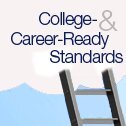
We’ve told you about PARCC’s decision to let states customize its test, harvesting a few or a lot of questions as they wish. This blending approach is one of the testing trends identified in a new study of how assessment is changing nationwide.
A new report from the Education Commission of the States says that more states are opting in to the “blend trend.” It rounds up other examples that we’ve reported to you previously: Michigan blending items from the Smarter Balanced test with its own, teacher-created questions; Massachusetts deciding to create a hybrid of PARCC and its own test, the MCAS; and Louisiana using a test that’s a mix of PARCC items and items created by its own vendor.

The blended approach comes with some caveats, though. According to the ECS:
While the blended approach may give states a way to navigate the complex political pressures related to assessments, potential drawbacks to this approach include: 1) possibly compromising comparability of results across states; 2) limiting states' access to some of the consortium's additional resources, such as aligned interim assessments, and 3) increasing development time and costs compared to other approaches. States that seek to follow the blended approach will need to carefully weigh the costs and benefits of this strategy."
The ECS notes another trend with a potentially big impact: states increasingly using college-entrance exams as their high school accountability test, as New Hampshire and Connecticut did when they opted to require the SAT instead of the Smarter Balanced test for their high school students. This can reduce layers of testing, since students in some states had to take required end-of-year or end-of-course tests along with the SAT or ACT. But drawbacks come with this choice, as well. As ECS points out:
[S]tudents who are not on a college track may not benefit or have an incentive to perform well [on college-entrance exams] unless these assessments are used for high stakes, such as high school graduation. Additionally, using one exam for multiple purposes may jeopardize that assessment's validity."
The report delves into other trends in assessment, too, which you’ve read about in the past couple of years on this blog: shifting membership in PARCC and Smarter Balanced, changes in the two consortia’s structure and offerings, and the movement in some states to allow families to opt out of testing.
Get Curriculum Matters delivered to your inbox as soon as new posts are published. Sign up here. Also, for analysis of news and policy about testing.
